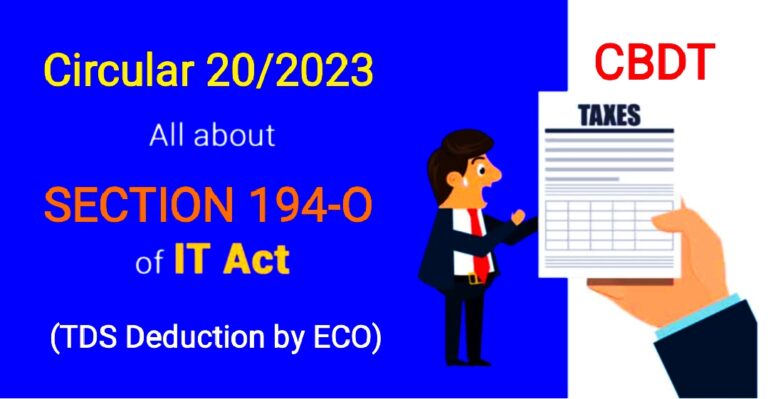CBDT Circular No. 20/2023 Dated. 28 December 2023: Comprehensive Guidelines on Deduction of Tax (TDS) by e-Commerce Operators (ECOs) from Sale of Goods or Services Using their Digital Platform
In a recent update, the Central Board of Direct Taxes, through Circular No. 20 of 2023 dated December 28, 2023, has issued comprehensive guidelines regarding the deduction of income tax (TDS) by E-commerce Operators (ECOs) under Section 194-O of the Income Tax Act.
The Finance Act of 2020 introduced Section 194-O, mandating E-commerce Operators to deduct income tax at a rate of one percent on the gross amount of goods or services sold through their digital platforms. Exemptions to this deduction are provided for specific individuals or Hindu undivided families meeting specific conditions.
As per Section 194-O of Income Tax Act, the deduction of TDS @ 1% should occur at the time of crediting the amount to the e-commerce participant’s account or at the time of payment, whichever comes first. Any payment made by a buyer to a seller in a transaction facilitated by the e-commerce operator is deemed as a payment by the operator to the seller and is included in the gross amount for tax deduction.
Section 194-0(4) of the Act empowers the Board, with the Central Government’s approval, to provide guidelines for addressing challenges. Circular No. 17 of 2020 (dated 29th September 2020) and Circular No. 20 of 2021 (dated 25th November 2021) previously outlined guidelines for section 194-0. Following received representations seeking further clarifications, the Board, under the authority of section 194-0(4) of the Act and with Central Government approval, now issues additional guidelines vide this Circular No. 20/2023 as given below.
1. Tax Deduction in Multiple ECO Transactions:
If multiple ECOs are involved in a single transaction, the responsibility for Section 194-O compliance depends on whether the seller-side ECO is the actual seller or not.
Situation 1: If the seller-side ECO is not the actual seller, the compliance lies with the seller-side ECO.
Situation 2: If the seller-side ECO is the actual seller, the compliance is with the ECO making the payment to the seller.
2. Inclusion of Various Fees in Gross Amount:
(i) Convenience fees, commissions, logistics charges, and delivery fees should be included in the “gross amount” for TDS purposes.
(ii) Payments made to platform providers for transaction facilitation are included if linked to a specific transaction.
3. Treatment of GST and Other Taxes:
GST, state levies, and other taxes are excluded from the gross amount if separately indicated in the invoice.
The treatment is based on whether tax is deducted at the time of credit or on a payment basis.
4. Handling Purchase Returns:
If tax has been deducted before a purchase return, adjustments can be made against the next transaction in the same financial year.
No adjustment is needed if the purchase return is replaced with goods.
5. Treatment of Discounts:
Seller discounts are subtracted from the product or service price for TDS calculation.
Discounts offered by ECOs are considered part of the gross amount.
Conclusion:
In conclusion, these guidelines aim to streamline TDS procedures for E-commerce Operators and ensure compliance with Section 194-O of the Income Tax Act. Clarity is provided on multiple scenarios, including the treatment of fees, taxes, and discounts. ECOs are advised to follow these guidelines for accurate TDS deduction and reporting.
To Download the CBDT Circular 20/2023 from I-T portal CLICK HERE
To Read about CBDT Notification 104/2023 (Amendment in Safe Harbour Rules) CLICK HERE
READ MORE

I loved you even more than you’ll say here. The picture is nice and your writing is stylish, but you read it quickly. I think you should give it another chance soon. I’ll likely do that again and again if you keep this walk safe.
Thank you very much for your appreciation on picture quality and writing style. But, I did not get your point in saying to give it another chance soon. Please elaborate that point to bring possible improvements in my blog. You are always welcome for constructive suggestions. Thanks